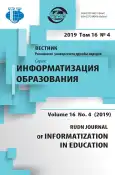Цифровое образование: от школы для всех к школе для каждого
- Авторы: Кондаков А.М.1, Костылева А.А.2
-
Учреждения:
- ООО «Мобильное электронное образование»
- Московский педагогический государственный университет
- Выпуск: Том 16, № 4 (2019)
- Страницы: 295-307
- Раздел: ДИДАКТИЧЕСКИЕ АСПЕКТЫ ИНФОРМАТИЗАЦИИ ОБРАЗОВАНИЯ
- URL: https://journal-vniispk.ru/2312-8631/article/view/333509
- DOI: https://doi.org/10.22363/2312-8631-2019-16-4-295-307
- ID: 333509
Цитировать
Полный текст
Аннотация
Проблема и цель. Статья посвящена проблеме развития цифрового образования. Разрыв между поколениями и социальными группами обостряет противоречия между системой образования и запросами информационного общества, а нарастание объемов, общедоступность, скорость получения и обмена знаниями изменили стиль познания современного человека. Ключевой компетенцией стало умение отличать важное от неважного, достоверное от недостоверного. У школьников необходимо целенаправленно развивать цифровую самоидентификацию. Все это порождает комплекс проблем, стоящих перед современной школой. Целью описываемого в статье исследования является выявление перспективных путей цифровизации школы, построение модели цифровой школы и определение комплекса факторов, значимых для преобразования школы для всех в школу для каждого. Методология. В ходе исследования на основе анализа существующих подходов к развитию цифровых технологий и цифровизации образования выявлены пути становления и развития цифровой школы. Определена структура ядра цифрового образования, обеспечивающего сопоставимость освоенных и проявляемых в различных видах деятельности личности знаний, ценностей, навыков и компетенций. Это ценностная, деятельностная и содержательная основа формирования цифровой социокультурной образовательной среды. Такое ядро предлагается рассматривать в качестве основы для разработки концепций предметных областей, ФГОС и образовательных программ всех уровней образования. Результаты. Дана трактовка термина «цифровое образование», под которым понимается образовательная деятельность, ключевыми факторами которой являются цифровые данные, обработка, обмен и результаты анализа которых позволяют личности достичь новых результатов образования в конкретной социокультурной ситуации. Согласно модели цифровая школа обеспечивает не только обучение и воспитание, но и эффективную интеграцию личности в высокотехнологичную быстроменяющуюся сложную среду. Образовательная экосистема представляет собой интегративную социокультурную среду, в центре которой находится не педагог традиционной школы, а обучающийся, окру- женный сверстниками и взрослыми, которые помогают ему реализовать персональную образовательную траекторию. Заключение. В статье обозначены предпосылки наступления новой эпохи - эпохи цифрового образования, сформулировано определение термина «цифровое образование», обоснована актуальность разработки и приведена структура ядра цифрового образования, описана модель цифровой школы, представлена структура образовательной экосистемы и обозначены эффекты от ее внедрения для различных стейкхолдеров.
Об авторах
Александр Михайлович Кондаков
ООО «Мобильное электронное образование»
Автор, ответственный за переписку.
Email: alex.m.kondakov@gmail.com
член-корреспондент РАО, доктор педагогических наук, генеральный директор ООО «Мобильное электронное образование
Российская Федерация, 121205, Москва, Большои ̆ бульвар, д. 42, стр. 1Анна Андреевна Костылева
Московский педагогический государственный университет
Email: kostyleva_anechka@mail.ru
кандидат психологических наук, директор Центра педагогического сетевого взаимодействия Института развития цифрового образования
Российская Федерация, 119991, Москва, ул. Малая Пироговская , д. 1, стр. 1Список литературы
- Weindorf-Sysoeva M.E., Subocheva M.L. “Cifrovoe obrazovanie” kak sistemoobrazujushhaja kategorija: podhody k opredeleniju [“Digital education” as a system-forming category: approaches to defi Vestnik Moskovskogo gosudarstvennogo oblastnogo universiteta. Serija: Pedagogika [Bulletin of the Moscow City Pedagogical University. Series: Pedagogy]. 2018. No. 3. Pp. 25–36.
- Grinshkun V.V., Remorenko I.M. Frontiry “Moskovskoj jelektronnoj shkoly” [Frontiers of “Moscow electronic school”]. Informatika i obrazovanie [Informatics and education]. 2017. No. 7(286). Pp. 3–8.
- Kondakov A.M., Vavilova A.A., Grigoriev S.G., Grinshkun V.V., Dronov V.P. i dr. Koncepcija sovershenstvovanija (modernizacii) edinoj informacionnoj obrazovatel’noj sredy, obespechivajushhej realizaciju nacional’nyh strategij razvitija Rossijskoj Federacii [Concept of improvement (modernization) of the unifi information educational environment, ensuring the implementation of national development strategies of the Russian Federation]. Pedagogika [Pedagogy]. 2018. No. 4. Pp. 98–125.
- Kondakov A.M. Kogo, zachem i chemu my uchim. Proekt izmenenij vo FGOS nachal’nogo i osnovnogo obshhego obrazovanija ne soderzhit priznakov cifrovoj jekonomiki [Whom, why and what we teach. The draft amendments to the GEF of primary and basic general education does not contain signs of the digital economy]. Uchitel’skaja gazeta. 2017, 31 oktjabrja. No. 44.
- Kondakov A.M. Sistemnoe myshlenie v cifrovoj jekonomike. Soderzhanie shkol’nogo obrazovanija: vchera, segodnja, zavtra (nachalo) [Systematic thinking in the digital economy. Contents of school education: yesterday, today, tomorrow (beginning)]. Uchitel’skaja gazeta. 2017, 26 sentjabrja. No. 39.
- Kondakov A.M. Sistemnoe myshlenie v cifrovoj jekonomike. Soderzhanie shkol’nogo obrazovanija: vchera, segodnja, zavtra (prodolzhenie) [Systematic thinking in the digital economy. The content of school education: yesterday, today, tomorrow (continued)]. Uchitel’skaja gazeta. 2017, 10 oktjabrja. No. 41.
- Carapkina Ju.M., Il’ichev E.D. Ispol’zovanie social’nyh setej v uchebnom processe kak vazhnoe uslovie professional’nogo samoopredelenija [The use of social networks in the educational process as an important condition for professional self-determination]. Vestnik Moskovskogo gorodskogo pedagogicheskogo universiteta. Serija: Informatika i informatizacija obrazovanija [Bulletin of the Moscow City Pedagogical University. Series: Informatics and Informatization of Education]. 2018. No. 2 (44). Pp. 85–90.
- Shnejder L.B., Symanjuk V.V. Pol’zovatel’ v informacionnoj srede: cifrovaja identichnost’ segodnja [User in the information environment: digital identity today]. Psihologicheskie issledovanija [Psychological research]. 2017. Vol. 10. No. 52. P. 7.
- Jakimenko T.A. Cifrovoe domashnee zadanie [Digital homework]. Vestnik Moskovskogo gorodskogo pedagogicheskogo universiteta. Serija: Informatika i informatizacija obra- zovanija [Bulletin of the Moscow City Pedagogical University. Series: Informatics and Informatization of Education]. 2019. No. 2(48). Pp. 94–99.
- Hansen L., Nissenbaum H. Digital Disaster, Cyber Security, and the Copenhagen School. International Studies Quarterly. 2009. Vol. 53. No. 4. Pp. 1155–1175.
- Lahlou S. Identity, Social Status, Privacy and Face-Keeping in Digital Society. Social Sciences Information. 2008. Vol. 47. No. 3. Pp. 299–330.
- Onalbek Z.K., Grinshkun V.V., Omarov B.S., Abuseytov B.Z., Makhanbet E.T., Kendzhaeva B.B. The Main Systems and Types of Forming of Future Teacher-Trainers’ Professional Competence. Life Science Journal. 2013. Vol. 10. No. 4. Pp. 2397–2400.
- Kushnir N., Manzhula A. Formation of Digital Competence of Future Teachers of Elementary School. Communications in Computer and Information Science. 2013. Vol. 347. Pp. 230–243.
- Sergis S., Sampson D.G., Giannakos M. Enhancing Student Digital Skills: Adopting an Ecosystemic School Analytics Approach. Proceedings of IEEE 17th International Conference on Advanced Learning Technologies, ICALT 2017. 2017. Pp. 21–25.
- Yang Y., Lewis E., Newmarch J. Profile-Based Digital Identity Management – a Better Way to Combat Fraud. Proceedings of International Symposium on Technology and Society, IEEE 2010. 2010. Pp. 260–267.
Дополнительные файлы









